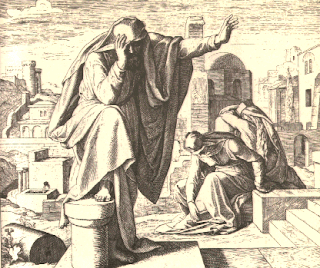Artist: Illustrator of Bible Card
published in 1904
TO CHEW ON: "Then Jesus said to those Jews who believed in Him, 'If you abide in My word, you are My disciples indeed. And you shall know the truth and the truth shall make you free.'" John 8:31-32
Here we have Jesus explaining to some new Jewish believers — perhaps even some Pharisees among then — the essence of discipleship. He said that:
if they would abide...
[Abide = meno: to remain or abide, to sojourn or tarry and not to depart; to continue to be present; to be held, kept continually, to last, endure, to remain and not to become different]
in His word...
those things He had just said about Himself:
- that He came from God (John 8:14).
- that God was His father (John 8:16).
- that God supported Him (John 8:18).
- that He would go away to a place they could not follow (John 8:21).
- that they would die in their sins unless they believed He was who He said He was (John 8:23-24).
- that He would be 'lifted up' - crucified - and thus prove that His life and death were God's initiative, not His own (John 8:28-29).
they would prove themselves His disciples.
And they would know...
[Know = ginosko: perceive, understand recognize, gain knowledge, realize, come to know. "Ginosko is the knowledge that has an inception, a progress, and an attainment. It is the recognition of truth by personal experience" - New Spirit-Filled Life Bible p. 1459.]
the truth...
[Truth = aletheia: the opposite of fictitious, feigned or false. It denotes veracity, reality, sincerity, accuracy, integrity, truthfulness, dependability and propriety.]
- Jesus brought it (John 1:17).
- Jesus was full of it (John 1:14).
- Jesus is it (John 14:6).
And the truth would set them free.
Free from what? It was not a freedom from ethnic, racial or political slavery. Rather it was freedom from the slavery of sin (8:34-36).
What strikes me about this recipe for discipleship is the faith needed to live it. These new believers would need to "abide" in Jesus' words (against all that their fellow Jews were saying and in the context, later, of Jesus' arrest, trial, and crucifixion). By doing this they would not only prove themselves His disciples but know (at the level of personal experience) the truth (Jesus and the fact of God's plan accomplished through Him — leading finally to freedom from sin — both its enslavement in this life and its final death-curse).
Discipleship for us takes no less "abiding" faith.
PRAYER: Dear Jesus, thank You for bringing truth, for being full of truth and being truth embodied. Help me to "abide" in You and Your words so I will know truth at the level of personal experience. Amen.
MORE: Jesus' extraordinary claims
Theologian and apologist Ravi Zacharias:
"The first and most important step to understanding the nature of truth is exemplified in a conversation between Jesus and Pilate. The conversation began with Pilate asking Jesus if indeed he was a king. The very surprising answer of Jesus was, "Are you asking this of your own, or has someone else set you up for this?"
In effect, Jesus was asking Pilate if this was a genuine question or purely an academic one. He was not merely checking on Pilate's sincerity. He was opening up Pilate's heart to himself, to reveal to Pilate his unwillingness to deal with the implications of Jesus's answer. Intent, in the pursuit of truth, is prior to content, or to the availability of it. The love of truth and the willingness to submit to its demands is the first step.
But second, Jesus said something even more extraordinary. After identifying his Lordship in a kingdom that was not of this world, he said, "They that are on the side of truth, listen to me" (John 18:37). Jesus was not merely establishing the existence of truth, but his pristine embodiment of it. He was identical with the truth. This meant that everything he said and did, and the life he lived in the flesh, represented that which was in keeping with ultimate reality. Therefore, to reject him is to choose to govern one's self with a lie" - (emphasis added) by Ravi Zacharias, in "The Empirical Demonstration of Truth" (quote from the RZIM website; the article is no longer online).













